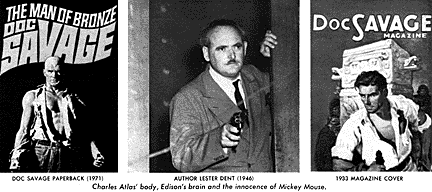
BOOKS -- TIME, JULY 5, 1971
Back to the
Gore of Yore
![]() A tall gray-haired man of distinguished appearance was browsing in a paperback
bookstore. Balzac, Eliot, James, Kafka, Proust-all at once his eye lighted
on a muscle-plated male glaring out of a black background. The slash, in
big red letters, read: DOC SAVAGE, THE MAN OF BRONZE! Startled, the browser
glanced left and right; nobody was looking. Then with a furtive movement
he snatched The Man of Bronze off its shelf and, slipping it deftly under
a copy of Hazlitt's essays, strolled thoughtfully toward the cashier.
A tall gray-haired man of distinguished appearance was browsing in a paperback
bookstore. Balzac, Eliot, James, Kafka, Proust-all at once his eye lighted
on a muscle-plated male glaring out of a black background. The slash, in
big red letters, read: DOC SAVAGE, THE MAN OF BRONZE! Startled, the browser
glanced left and right; nobody was looking. Then with a furtive movement
he snatched The Man of Bronze off its shelf and, slipping it deftly under
a copy of Hazlitt's essays, strolled thoughtfully toward the cashier.
Doc Savage? If you are over 40, you don't have to ask. Doc was the Hercules
of the '30s, the natural father of both Superman and James Bond. Once a
month, back before the war, every redblooded American boy who could lay
his hands on 10 cents plunked it down for a Street & Smith pulp called
Doc Savage magazine. Now, once a month and at about seven times the price,
any redblooded middle-aged man who pines for the gore of yore can renew
his literary acquaintance with derring-Doc.
In the past six years, Bantam Books has reprinted 61 of the 181 Doc Savage
stories that first appeared between 1933 and 1945; No. 62, The Pirate's
Ghost, will hit the racks next week. The 10.5 million copies now in
print have realized about $4.5 million in sales. Doc Savage fan clubs have
sprung up and three producers have been negotiating for film and television
rights. "We've struck into a bronze mine," Bantam's Marc Jaffe
explains. "Publishing one a month, we've got six years to go in the
series. Then we can start over."
Doc was born in the early '30s under the sign of the dollar. "We're
in a depression," the business manager of Street & Smith instructed
his editors. "People feel weak and defeated. We need a hero so strong
and so intelligent that nothing can stop him." The job of creating
this giant was assigned to an unathletic and sketchily educated young writer
named Lester Dent. Trained as a telegrapher, Dent was innocent of grammar
("of no value to we") and guilty of heinous cliches ("The
warriors were certainly a chagrined lot"), but he could put out the
prose at a Remingtonwrecking rate. Under the pen name Kenneth Robeson, he
knocked off a 60,000word Doc Savage novel almost every month for nearly
15 years. As stories, most of them are bloody good. He is a funhouse mirror
of the America that loved him and apparently still does-a big square joe
with the body of Charles Atlas, the brain of Thomas Edison, and the implacable
innocence of Mickey Mouse.
Time the pulps |
